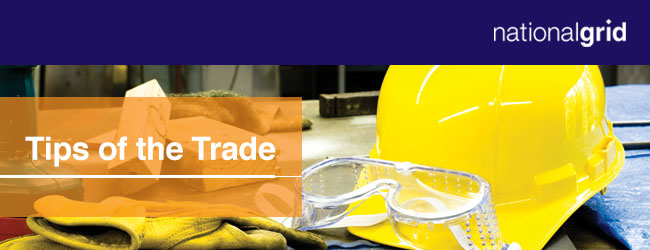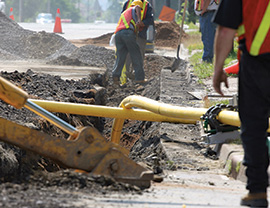
If you suspect a natural gas leak
Welcome to National Grid’s Tips of the Trade. National Grid is committed to your safety, and these tips are intended to help you work safely near our facilities. Please review these tips with your coworkers at your tailgate or toolbox meetings before work begins.
Recognizing gas leaksIf you’re like most people, you’ve learned to rely on your sense of smell to detect a natural gas leak. In and around your home, that distinctive, sulfur-like odor is in fact a sure sign that natural gas is leaking from an appliance or pipe. But odor is not the only sign, especially on the job site. And in some cases, natural gas leaks don’t smell at all. National Grid adds the odorant mercaptan to natural gas. This odor, which is similar to sulfur or rotten eggs, helps most people smell a leak. But in some cases, the odor of natural gas can be masked by other smells, or the gas can be stripped of its odor. This is known as “odor fade.” So be sure to not only rely on your nose, but your eyes and ears as well to detect the warning signs of a gas leak. Be alert for hissing, whistling or roaring sounds; dirt blowing into the air from a hole in the ground; continuous bubbling in water; or a damaged connection to a gas appliance. Respond safely to a natural gas emergencyIf you hit a gas pipeline or suspect a gas leak, protect yourself, your coworkers and the public by taking the following steps:
There’s no such thing as minor damageEven a slight gouge, scrape or dent in a pipeline or its coating may cause a catastrophic break or leak in the future. Cutting or damaging a wire attached to or running alongside the pipe may make it impossible to locate. Report ALL gas line contacts to National Grid so crews can inspect the line and make necessary repairs. Would you like to know more?Additional overhead and digging guidelines, case studies, instructional videos and training tools can all be found, at no charge to you, on National Grid’s e-SMARTworkers website. Do you like this email series? Do you find the information helpful? We’d like to know. Please reply to this email and tell us what you think, or let us know what topics you’d like to see in future emails. For more contractor safety information, visit ngridsafety.com. |
||||||||||||||||
 |
Smell Gas. Act Fast. |
|||||||||||||||
Call 811 or enter an online request at least 72 hours before digging in Massachusetts and Rhode Island (excluding weekends and legal holidays) and at least two full working days in New York (excluding the day you call and weekends and legal holidays). It’s the law!
|
||||||||||||||||
| ||||||||||||||||
| #10982 |
